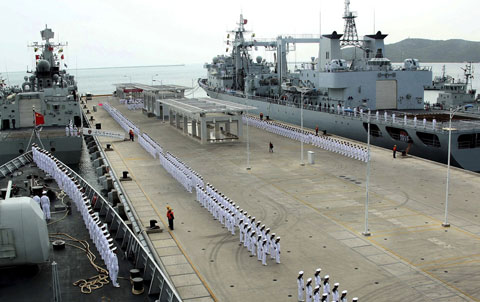China targets pirates in
groundbreaking mission


|
Comments that include profanity or personal attacks or other inappropriate comments or material will be removed from the site. Additionally, entries that are unsigned or contain "signatures" by someone other than the actual author will be removed. Finally, we will take steps to block users who violate any of our posting standards, terms of use or privacy policies or any other policies governing this site. Please review the full rules governing commentaries and discussions. You are fully responsible for the content that you post. |
Friday, December 26, 2008; 3:18 PM
GUANGZHOU, China -- Chinese warships headed toward Somali waters Friday to combat piracy, the first time the communist country has sent ships on a mission that could involve fighting so far beyond its territorial waters.
The deployment to the Gulf of Aden, which has been plagued by increasingly bold pirate attacks in recent months, marks a major step in the navy's evolution from mostly guarding China's coasts to patrolling waters far from home.
The move was welcomed by the U.S. military, which has been escorting cargo ships in the region along with India, Russia and the European Union. But analysts predicted the Chinese intervention could be troubling to some Asian nations who might see it as a sign of the Chinese military becoming more aggressive.
The naval force that set sail from southern Hainan on Friday afternoon included a supply ship and two destroyers _ armed with guided missiles, special forces and two helicopters. China announced it was joining the anti-piracy mission Tuesday after the U.N. Security Council authorized nations to conduct land and air attacks on pirate bases.
Pentagon spokesman Maj. Stewart Upton said the U.S. welcomed China's move.
Pirates working out of Somalia have made an estimated $30 million this year, seizing more than 40 vessels off the country's 1,880-mile (3,000-kilometer) coastline. Most of the attacks have occurred in the Gulf of Aden, one of the world's busiest shipping lanes.
Deploying ships to the area helped stoke national pride among Chinese who feel their increasingly wealthy nation should be playing a bigger role in world affairs.
The front-page of the Southern Metropolis Daily _ one of southern China's most popular newspapers _ had a photo Friday of a special forces member posing with his finger on the trigger of an assault rifle armed with a grenade launcher. A headline read, "They won't rule out a direct conflict with pirates."
For several decades, China has kept a massive army focused on protecting its land borders, while the country's navy was relatively weak. But in recent years, as China became more deeply involved in the global economy, it concluded that a stronger navy was needed to protect its increasingly vital sea shipments of oil, raw materials and other goods.
China has been rapidly beefing up its navy with new destroyers, submarines and missiles. Naval officers have even been talking about building an aircraft carrier that could help the navy become a "blue-water" force _ a fleet capable of operating far from home.
Denny Roy, a senior fellow at the East-West Center in Hawaii, said the naval buildup and the mission to Somalia are the latest signs that China is no longer willing to rely on the U.S. or other foreign navies to protect its increasingly global interests.
"China has not been dissuaded from entering the field," Roy said. "That leaves open the possibility of a China-U.S. naval rivalry in the future."












 Discussion Policy
Discussion Policy




 06151 서울 강남구 테헤란로 309, 1205호 (삼성제일빌딩)
06151 서울 강남구 테헤란로 309, 1205호 (삼성제일빌딩)